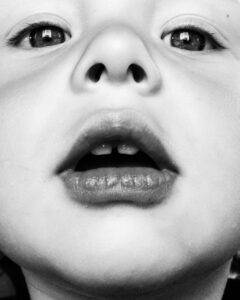When a newborn baby with teeth arrives, it can catch parents off guard. These early teeth, known as natal teeth, are present at birth or emerge within the first month of life. Natal teeth are distinct from neonatal teeth, which appear between the first and third months after birth.
Though these early teeth are uncommon, occurring in approximately 1 in every 2,000 to 3,000 births, their appearance prompts various questions and concerns among new parents.
Causes of Natal Teeth
Genetic Factors: A history of natal teeth in the family line is one of the primary reasons for a newborn baby with teeth. This hereditary trait is typically benign and doesn’t indicate any underlying health problems. Instead, it’s a unique characteristic passed down through generations.
Syndromes and Health Conditions: In rare instances, the presence of natal teeth is linked to certain syndromes or health conditions such as Ellis-van Creveld syndrome, Sotos syndrome, and Hallermann-Streiff syndrome. If your baby has natal teeth accompanied by other unusual symptoms, seek medical advice for a thorough evaluation.
Developmental Variations: Sometimes, a newborn baby with teeth is experiencing a variation in normal development. The timeline for tooth development varies among infants. Some babies begin teething earlier than the average.
Potential Issues with Natal Teeth
Feeding Difficulties: This is one of the primary concerns for a newborn baby with teeth. Natal teeth cause discomfort for the baby and the mother during breastfeeding. These early teeth might be loose and make latching difficult or painful, leading to challenges in feeding.
Mouth Ulcers: Natal teeth irritate and lead to ulcers in the baby’s mouth. Known as Riga-Fede disease, these develop from the constant friction of the natal teeth against the baby’s tongue or gums. This condition is painful and interferes with feeding and overall comfort.
Risk of Aspiration: Loose natal teeth pose a significant risk of aspiration. This happens if a tooth dislodges and gets into the baby’s airway. This is a dangerous situation that requires immediate medical attention to avert potential complications.
How to Manage Natal Teeth
1. Consult a Pediatrician
This is the first step in managing a newborn baby with teeth. The pediatrician assesses the stability of the teeth and determines if intervention is needed. They determine if the teeth need to be removed. This evaluation is crucial to identify and address any underlying conditions.
2. Feeding Adjustments
To alleviate discomfort during breastfeeding, consider using nipple shields. These protect the mother’s nipples from being bitten by the natal teeth and help the baby latch more comfortably. If breastfeeding becomes too challenging, switching to bottle feeding is a temporary solution to ensure the baby receives adequate nutrition without pain.
3. Monitoring and Hygiene
Proper oral hygiene is essential, even for newborn baby with teeth. Gently cleaning the baby’s gums and teeth with a soft, damp cloth helps prevent infection and irritation. Regular monitoring of the natal teeth is also important to catch any issues, such as loosening or ulcer formation, early on.
4. Dental Visits
Scheduling an appointment with a pediatric dentist is highly recommended for newborn baby with teeth. They provide specialized care and advice on maintaining oral health for your newborn baby with teeth. They also monitor the teeth for any potential problems and offer guidance on how to care for them as your baby grows.
When to Remove Natal Teeth
- Loose Teeth: If the natal teeth are very loose, removal is necessary to prevent the risk of aspiration. A pediatric dentist or pediatrician performs this procedure safely so your baby is free from the risk.
- Causing Ulcers or Feeding Problems: If the natal teeth are causing significant feeding difficulties or persistent mouth ulcers, removal is the best option to ensure the baby’s comfort and safety. This decision should be made in consultation with a healthcare professional with expert guidance based on the baby’s specific situation.
It should be emphasized that the removal of natal teeth won’t impact the growth of permanent teeth. Natal teeth are part of the primary set, and their removal will not hinder the development of future teeth. This reassurance helps parents make informed decisions in managing natal teeth.
What to Expect After Removal of Natal Teeth
- Healing Process: If removal of natal teeth is necessary, parents worry about their baby’s recovery. Typically, the healing process is straightforward and quick. The pediatric dentist will provide care instructions to ensure the baby’s mouth heals properly. They advise on gentle cleaning and monitoring for any signs of infection or irritation.
- Continued Dental Care: Post-removal, maintaining oral hygiene is crucial. Even though the teeth are gone, keeping the baby’s gums clean helps prevent infections. Regular visits to the pediatric dentist should continue to ensure the overall health of the baby’s mouth as they grow.
- Monitoring for New Teeth: After natal teeth are removed, parents should watch for the emergence of new teeth. These will follow the typical teething schedule, usually around six months of age. Keeping an eye on the development of new teeth ensures they grow healthy and strong.
The Emotional Impact of Newborn Baby with Teeth
Parental Concerns: Finding out your newborn baby with teeth is understandably surprising which leads to a range of emotions. Parents are concerned about their baby’s health, development, and overall well-being. Communicate these concerns with healthcare professionals who can provide reassurance, guidance, and detailed information.
Baby’s Comfort: Ensuring your baby’s comfort and health is the top priority. With proper care and attention, newborn baby with teeth grow and develop normally without lasting issues. Addressing any discomfort or complications early on helps create a more comfortable environment for your baby.
Supporting Your Baby’s Oral Health
- Teething Comfort: For babies who experience discomfort during teething, several remedies help. Teething rings, cold washcloths, and gentle gum massages provide relief. Avoid teething gels with benzocaine or lidocaine, as these can be harmful to infants.
- Early Dental Visits: Starting dental visits early sets the foundation for good oral health. A pediatric dentist provides guidance tailored to your baby’s unique needs, especially for a newborn baby with teeth. Early visits help in monitoring the growth and development of the teeth and jaw, addressing any issues promptly.
- Establishing a Dental Routine: Creating a dental routine early helps instill good habits. For a newborn, this includes gently wiping the gums after feedings. As teeth begin to emerge, use a soft baby toothbrush and water to keep them clean. Avoid toothpaste until the child is older unless recommended by a dentist.
The Importance of Nutrition
Breastfeeding and Bottle Feeding: Breastfeeding and bottle feeding play essential roles in a baby’s oral health. Breast milk contains antibodies that help fight bacteria, promoting a healthy mouth environment. For bottle-feeding, avoiding sugary liquids prevents early tooth decay.
Introducing Solid Foods: When introducing solid foods, opting for nutrient-rich choices supports overall health and oral development. Foods rich in calcium, such as yogurt and cheese, are beneficial for growing teeth. Additionally, offering a variety of textures encourages chewing and strengthening the jaws and gums.
Avoiding Harmful Habits: Pacifiers and thumb-sucking are common soothing habits, but they impact oral health if continued for too long. It’s recommended to wean babies off pacifiers and discourage thumb-sucking by the age of three to prevent potential dental issues like misaligned teeth.
Building a Positive Dental Experience
- Make Dental Visits Fun: Creating a positive association with dental visits makes a difference in a child’s willingness to go to the dentist. Reading books about visiting the dentist, playing pretend dental visits, and talking about the dentist in a positive way help reduce anxiety.
- Praise and Encouragement: Encourage good dental habits with praise and positive reinforcement to help children feel good about taking care of their teeth. Celebrate milestones like the first dental visit or successful brushing sessions to build a positive attitude towards oral care.
- Educate Older Siblings: If there are older siblings, involve them in the baby’s dental care routine to set a good example. Older children help by showing the baby how they brush their teeth and why it’s important, turning dental care into a family activity.
Preparing for Future Dental Milestones
Teething Timeline: Understanding the typical teething timeline helps parents know what to expect. Generally, the first teeth to appear are the lower central incisors, followed by the upper central incisors. By the age of three, most children have a full set of primary teeth.
Regular Dental Check-Ups: Regular dental check-ups are crucial for monitoring a child’s oral health. These visits allow the dentist to check for any issues early on and provide preventative care. The American Academy of Pediatric Dentistry recommends scheduling the first dental visit by the age of one or within six months of the first tooth appearing.
Preventative Care: Preventative care, such as fluoride treatments and dental sealants, protects a child’s teeth from decay. Fluoride strengthens the enamel, making teeth more resistant to acid attacks from plaque bacteria and sugars. Dental sealants are applied to the chewing surfaces of the back teeth to protect them from cavities.
The Role of Pediatric Dentistry: Specialized Care for Natal Teeth
Pediatric dentists provide specialized care for newborn baby with teeth. They assess the stability of the teeth, offer advice on managing feeding difficulties, and recommend treatments if necessary. This specialized care ensures that your baby’s oral health is well-maintained from a tender age.
FAQs About Newborn Baby with Teeth
Are Natal Teeth Harmful?
Natal teeth are not typically harmful but require monitoring. They cause issues like feeding difficulties or mouth ulcers, but these can be properly managed. Consulting with healthcare professionals ensures that any potential problems are addressed promptly.
Do Natal Teeth Need to Be Removed?
Not necessarily. Removal is considered if the teeth are loose, causing significant feeding problems, or posing a risk of aspiration. A healthcare professional provides the best advice based on individual cases.
How Should I Care for My Baby’s Natal Teeth?
Keep the teeth and gums clean with a soft, damp cloth. Monitor for any signs of irritation or loosening and consult a pediatric dentist for regular check-ups and advice. Maintaining proper oral hygiene helps prevent infections and ensures the baby’s comfort.
Resources for Parents with Newborn Baby with Teeth
Stay Informed with Omega Pediatrics
Educating yourself about natal teeth and their implications helps you feel more prepared and confident in managing your baby’s oral health. For more information on how to care for a newborn baby with teeth and other pediatric health topics, visit Omega Pediatrics.
Your experienced provider at Omega Pediatrics offers a wealth of resources and professional advice to help parents navigate the early years of their child’s life.
- Pediatric Dental Associations: Organizations like the American Academy of Pediatric Dentistry provide valuable resources and guidelines for parents. Their websites offer tips on dental care, teething, and finding a pediatric dentist.
- Communicate with Healthcare Providers: Open communication with your pediatrician and pediatric dentist is essential. Share any concerns or observations you have about your baby’s natal teeth. Healthcare providers offer guidance, reassurance, and practical advice tailored to your baby’s needs.
- Community Support: Joining parenting groups, either online or in person, provides support and shared experiences. Other parents offer insights and advice on managing natal teeth and other aspects of infant care.
Take Special Care with Your Newborn Baby with Teeth
Discovering a newborn baby with teeth can be a surprising experience for new parents. Understanding the causes, potential issues, and management options helps ensure your baby’s health and comfort. Always consult with healthcare professionals for personalized advice and care tailored to your unique situation.
With the right approach and support, your baby can thrive, teeth and all. For more insights on newborn care, check out these helpful resources from Omega Pediatrics:
- Newborn Baby with Teeth: What Parents Need to Know for a Healthy Start
- Breastfeeding 101: Essential Tips, Benefits, and Solutions for New Mothers
By staying informed and proactive, you can navigate the journey of raising a healthy and happy baby, even when surprises like natal teeth come your way. With proper care, monitoring, and professional guidance, your baby can grow and develop normally, ensuring a bright and healthy future.







